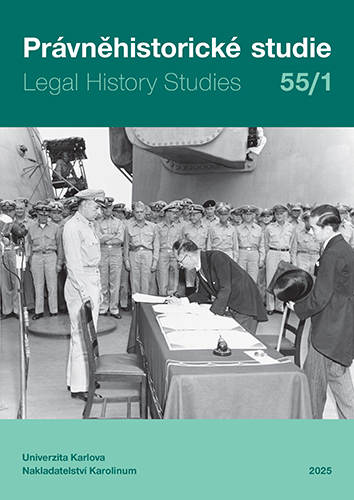Parental Power Versus Parental Responsibility. Polish and East-Central European Case in Historical Perspective
Parental Power Versus Parental Responsibility. Polish and East-Central European Case in Historical Perspective
Author(s): Bartosz Kamil TruszkowskiSubject(s): History, Law, Constitution, Jurisprudence, History of Law, International Law, Social history, Sociology of Law
Published by: Univerzita Karlova v Praze, Nakladatelství Karolinum
Keywords: parental authority; parental responsibility; family law; children’s rights; Poland; Central Europe; Eastern Europe
Summary/Abstract: Until the early 19th century, the selection of educational measures available to parents in relation to the children under their care was not usually legally restricted. A change in this issue can be observed with the emergence of family law regulations in European civil law codifications. In the case of the Polish territories that had been under Russian, Prussian/German and Austrian rule since 1795, the laws enacted on this issue were not of a native, Polish character, but were imposed by the three ruling states. Each of these laws, which were in force in the 19th century, explicitly referred to the parental authority. Due to the political distribution of power at the time, the same provisions (Russian, German and/or Austrian) were in force in other regions of East-Central Europe, which today constitute the territory of Estonia, Latvia, Lithuania, Belarus, Ukraine and Czechia. The exception to this was the Kingdom of Hungary (including present-day Slovakia), which enjoyed wide legal autonomy under the Austrian Empire and later the Austro-Hungarian Monarchy, as well as Kingdom of Romania (including present-day Moldova), which was creating its own legislation. The situation changed after the First World War, when newly established or reborn independent states adapted existing laws to their needs or enacted their own, and after the Second World War, when the whole of East-Central Europe found itself in the Communist Eastern Bloc. In that time, we can observe an increasing interference in the autonomy of parents, when, for example, in Polish provisions disciplining disappeared from the catalogue of explicitly mentioned educational measures. Attention should also be paid to international law, especially the Convention on the Rights of the Child, and its implementation into the legal order of former socialist states. The author attempts to review and briefly summarize the regulations on parental authority in the basic legal acts in force in Poland and other East-Central European states throughout history.
Journal: Právněhistorické studie
- Issue Year: 55/2025
- Issue No: 1
- Page Range: 133-156
- Page Count: 24
- Language: English

